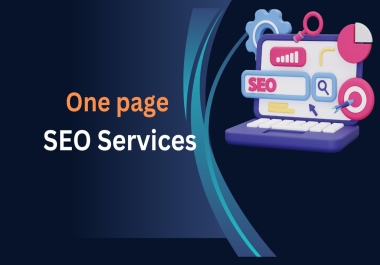Service
Professional SEO Audit & Website Analysis for Better Traffic

Unlock the full potential of your website with our Professional SEO Audit & Website Analysis for Better Traffic. Our expert team provides a comprehensive SEO audit report, tailored to your needs, covering all essential aspects:
One-Page Website Optimization (On-Page SEO Optimization)One-page website optimization is an SEO strategy that focuses on optimizing all the elements of a single web page to ensure it ranks well on search engines while providing a great user experience. This is especially important when you are working with landing pages, product pages, or any page where you want to attract visitors and convert them. Below are key aspects of one-page optimization:
1. On-Page SEO Optimization
Optimizing your one-page website in this way increases the likelihood of higher search rankings, better traffic, and a more effective user interaction.
One-Page Website Optimization (On-Page SEO Optimization)One-page website optimization is an SEO strategy that focuses on optimizing all the elements of a single web page to ensure it ranks well on search engines while providing a great user experience. This is especially important when you are working with landing pages, product pages, or any page where you want to attract visitors and convert them. Below are key aspects of one-page optimization:
1. On-Page SEO Optimization
- Meta Tags:
Ensure your meta title and meta description are optimized with relevant keywords. The meta title should clearly describe the page’s content, and the meta description should encourage users to click through to your website from search results.
- Heading Tags:
Use heading tags (H1, H2, H3) properly to structure your content and make it easier for both users and search engines to understand. H1 tags should contain the main topic or title, and H2 and H3 tags are used for subheadings.
- Keyword Optimization:
Use relevant and targeted keywords naturally throughout your content. Avoid keyword stuffing, but make sure that the keywords align with your content's theme.
- Internal Linking:
Link to other pages or relevant content on your site. This improves crawlability and helps to reduce bounce rates by guiding users to explore more pages.
- Image Alt Text:
Make sure every image has descriptive ALT text. This helps search engines understand what the image is about and improves accessibility.
- Page Speed:
Optimize the load time of your page. Faster pages are preferred by Google and provide a better user experience. You can use tools like Google PageSpeed Insights to analyze and improve your page speed.
- Mobile Optimization:
Ensure your page is mobile-friendly. Use responsive design so that your page adjusts well to different screen sizes. You can test this with Google's Mobile-Friendly Test.
- Rich Snippets:
Implement schema markup to provide additional information in search results, like reviews, ratings, and FAQs. This can help your page stand out and improve click-through rates.
- Clear Content:
Your content should be clear, readable, and easily digestible. Break up large blocks of text, use bullet points, and include relevant images to enhance the user experience.
- Call-to-Action (CTA):
Make sure there are clear and visible CTAs, such as "Buy Now," "Sign Up," or "Learn More." These should guide users toward taking the next step.
- Navigation:
- Ensure the navigation on your page is intuitive and user-friendly. Visitors should be able to find the information they need quickly and easily.
- Unique Content:
Content should be original and provide value to the readers. Google favors pages that offer unique, well-written, and informative content.
- Content Length:
Your page’s content should be of an adequate length—typically between 500 to 1500 words, depending on the topic. It should be detailed enough to answer users’ questions while remaining concise.
- Visual Content:
Use images, infographics, videos, and other visual elements to complement your text content. Visuals can engage users better and make the content more shareable.
- High-Quality Backlinks:
Your page should have relevant, high-quality backlinks that help improve your website's authority and visibility in search results.
- SEO-Friendly URL Structure:
Ensure that the URL of your page is simple, short, and includes your target keyword(s). This improves the page's chances of ranking well.
- Google Analytics & Search Console:
Use tools like Google Analytics and Google Search Console to track the performance of your page. These tools help you understand your audience, monitor traffic, and identify areas for improvement.
Optimizing your one-page website in this way increases the likelihood of higher search rankings, better traffic, and a more effective user interaction.
Buy this service in two easy steps
Order Now $5


